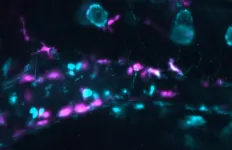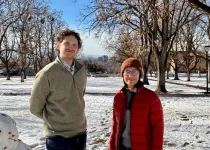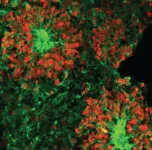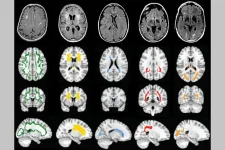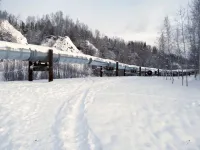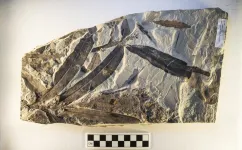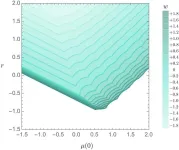Allen Institute names Julie Harris, Ph.D., as new Vice President of The Paul G. Allen Frontiers Group
Harris is a leader in non-profit, biotech and academic science sectors with a passion for accelerating early discovery efforts in service of human health
2024-12-17
(Press-News.org) SEATTLE, WASH.—December 17, 2024—The Allen Institute today announced the appointment of Julie Harris as the new Vice President of The Paul G. Allen Frontiers Group. Harris was previously Executive Vice President of Research Management at the Cure Alzheimer’s Fund where she oversaw the funding strategy and research priorities for a ~$29 million grant portfolio in support of the most promising science and scientists working to end the burden of Alzheimer’s disease.
Between 2011 and 2020 Harris worked at the Allen Institute for Brain Science as a researcher and Associate Director of Neuroanatomy where she played pivotal roles building several of the Institute’s signature, foundational open science resources, including the Allen Mouse Brain Connectivity Atlas.
“We are thrilled to welcome Julie back to the Allen Institute in her new role as Vice President. Julie's deep knowledge of the Institute's science, dating back to its early days, will help us expand our global impact in life sciences and human health,” said Rui Costa, D.V.M., Ph.D., President and CEO of the Allen Institute. “Julie also brings valuable experience from industry and funding landscapes, which will be instrumental in launching new projects and fostering innovative collaborations."
Harris was also Vice President of Preclinical Biology at Cajal Neuroscience, a Seattle biotech startup focused on identifying therapies for neurodegenerative disease.
“I am extremely excited to be returning to the Allen Institute. Truly game-changing science opens entirely new fields with impact that exceeds expectations,” said Harris. “Ideas can come from surprising sources, and I look forward to working with The Paul G. Allen Frontiers Group to find and support these vital discoveries.”
Harris received a B.S. in Zoology from Michigan State University, a Ph.D. in Neurobiology and Behavior from the University of Washington, and has 50 peer-reviewed publications to her name.
About the Allen Institute
The Allen Institute is an independent, 501(c)(3) nonprofit research organization founded by philanthropist and visionary, the late Paul G. Allen. The Allen Institute is dedicated to answering some of the biggest questions in bioscience and accelerating research worldwide. The Institute is a recognized leader in large-scale research with a commitment to an open science model. Its research institutes and programs include the Allen Institute for Brain Science, launched in 2003; the Allen Institute for Cell Science, launched in 2014; the Allen Institute for Immunology, launched in 2018; and the Allen Institute for Neural Dynamics, launched in 2021. In 2016, the Allen Institute expanded its reach with the launch of The Paul G. Allen Frontiers Group, which identifies pioneers with new ideas to expand the boundaries of knowledge and make the world better. For more information, visit alleninstitute.org.
About The Paul G. Allen Frontiers Group
The Paul G. Allen Frontiers Group, a division of the Allen Institute, is dedicated to exploring the landscape of bioscience to identify and foster ideas that will change the world. The Frontiers Group recommends funding to the Paul G. Allen Family Foundation, which then invests through award mechanisms to accelerate our understanding of biology, including: Allen Discovery Centers at partner institutions for leadership-driven, compass-guided research; and Allen Distinguished Investigators for frontier explorations with exceptional creativity and potential impact. The Paul G. Allen Frontiers Group was founded in 2016 by the late philanthropist and visionary Paul G. Allen. For more information, visit alleninstitute.org/division/frontiers-group/
# # #
Media Contact
Liz Dueweke, Sr. Communications and Media Relations Specialist
206-519-8527 | liz.dueweke@alleninstitute.org
END
[Attachments] See images for this press release:

ELSE PRESS RELEASES FROM THIS DATE:
2024-12-17
Downloadable assets for media use:
https://uoregon.canto.com/b/MSHJ8
EUGENE, Ore. — Dec. 18, 2024 — After a meal of questionable seafood or a few sips of contaminated water, bad bacteria can send your digestive tract into overdrive. Your intestines spasm and contract, efficiently expelling everything in the gut — poop and bacteria alike.
A new study from the University of Oregon shows how one kind of bacteria, Vibrio cholerae, triggers those painful contractions by activating the immune system. The research also finds a more general explanation for how the gut rids itself of unwanted intruders, which could also help scientists ...
2024-12-17
Huntsman Cancer Institute at the University of Utah (the U) has joined other institutions in an innovative clinical trials program designed to match patients with acute myeloid leukemia (AML) and myelodysplastic syndromes (MDS) with a clinical trial specifically designed for the genetic signature of their disease. Sponsored by the National Cancer Institute (NCI), the myeloMATCH program aims to improve precision medicine, the use of therapies ...
2024-12-17
It’s well established that urban tree cover provides numerous environmental and psychological benefits to city dwellers. Urban trees may also bolster education outcomes and their loss could disproportionately affect students from low-income families, according to new research by University of Utah social scientists.
Economics professor Alberto Garcia looked at changes in school attendance and standardized test scores at schools in the Chicago metropolitan region over the decade after a non-native ...
2024-12-17
A new study offers hope for people who are blind or have low vision (pBLV) through an innovative navigation system that was tested using virtual reality. The system, which combines vibrational and sound feedback, aims to help users navigate complex real-world environments more safely and effectively.
The research from NYU Tandon School of Engineering, published in JMIR Rehabilitation and Assistive Technology, advances work from John-Ross Rizzo, Maurizio Porfiri and colleagues toward developing a first-of-its-kind ...
2024-12-17
LA JOLLA, CA—Microgravity is known to alter the muscles, bones, the immune system and cognition, but little is known about its specific impact on the brain. To discover how brain cells respond to microgravity, Scripps Research scientists, in collaboration with the New York Stem Cell Foundation, sent tiny clumps of stem-cell derived brain cells called “organoids” to the International Space Station (ISS).
Surprisingly, the organoids were still healthy when they returned from orbit a month later, but the cells had matured faster compared ...
2024-12-17
Researchers at Washington University School of Medicine in St. Louis have been awarded $7.5 million from the National Institutes of Health (NIH) to investigate a form of dementia caused by cerebral small vessel disease, the second-leading cause of dementia after Alzheimer’s disease.
The grant funds the Vascular Contributions to Cognitive Impairment and Dementia (VCID) Center, which is a National Institute of Neurological Disorders and Stroke “Center Without Walls” initiative that will coordinate researchers at six sites across ...
2024-12-17
New Haven, Conn. — Could complex beliefs like paranoia have roots in something as basic as vision? A new Yale study finds evidence that they might.
When completing a visual perception task, in which participants had to identify whether one moving dot was chasing another moving dot, those with greater tendencies toward paranoid thinking (believing others intend them harm) and teleological thinking (ascribing excessive meaning and purpose to events) performed worse than their counterparts, the study found. Those individuals more often — and confidently — claimed one dot was chasing the other when it wasn’t.
The findings, published Dec. 17 in ...
2024-12-17
The social cost of carbon — an important figure that global policymakers use to analyze the benefits of climate and energy policies — is too low, according to a study led by the University of California, Davis.
The study, published today in the journal Proceedings of the National Academy of Sciences (PNAS), shows that current estimates for the social cost of carbon, or SCC, fail to adequately represent important channels by which climate change could affect human welfare. When included, the SCC increases to just over $280 per ton of CO2 emitted in 2020 — more than double the ...
2024-12-17
In 1969, fossilized leaves of the species Othniophyton elongatum — which translates to “alien plant” — were identified in eastern Utah. Initially, scientists theorized the extinct species may have belonged to the ginseng family (Araliaceae). However, a case once closed is now being revisited. New fossil specimens show that Othniophyton elongatum is even stranger than scientists first thought.
Steven Manchester, curator of paleobotany at the Florida Museum of Natural History, has studied 47-million-year-old fossils from Utah for several years. While visiting ...
2024-12-17
String theory, conceptualized more than 50 years ago as a framework to explain the formation of matter, remains elusive as a “provable” phenomenon. But a team of physicists has now taken a significant step forward in validating string theory by using an innovative mathematical method that points to its “inevitability.”
String theory posits that the most basic building blocks of nature are not particles, but, rather, one-dimensional vibrating strings that move at different frequencies ...
LAST 30 PRESS RELEASES:
[Press-News.org] Allen Institute names Julie Harris, Ph.D., as new Vice President of The Paul G. Allen Frontiers Group
Harris is a leader in non-profit, biotech and academic science sectors with a passion for accelerating early discovery efforts in service of human health

